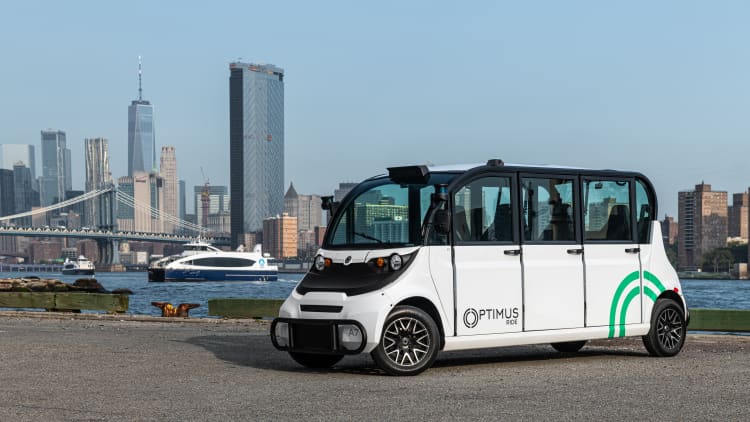The Future of Autonomous Vehicles And Transportation: Revolutionizing Our Commutes
The future of autonomous vehicles and transportation is bright, with advancements expected to revolutionize the way we travel. With the introduction of self-driving cars and trucks, we can expect increased safety, reduced traffic congestion, and improved efficiency in transportation systems.
These autonomous vehicles rely on advanced technologies such as artificial intelligence (ai) and sensors to navigate roads and make intelligent decisions. Governments and industries are investing heavily in research and development to realize the full potential of autonomous vehicles. As the technology continues to evolve, we can look forward to a future where self-driving vehicles are commonplace, transforming the way we live and travel.
Exciting times lie ahead as autonomous vehicles reshape the transportation landscape.

Credit: www.notateslaapp.com
Transforming Our Daily Commutes
The future of transportation is being transformed by autonomous vehicles, revolutionizing our daily commutes. These self-driving vehicles are poised to make a significant impact on our lives. With their advanced technologies and capabilities, they have the potential to enhance road safety, reduce traffic congestion, and improve overall transportation efficiency.
Imagine a future where you can relax, work, or socialize during your daily commute while your autonomous vehicle seamlessly navigates the roads. No longer will you have to worry about the stresses of driving, parking, or finding your way in unfamiliar areas.
Autonomous vehicles promise a future of convenience, accessibility, and sustainability, positively shaping our daily lives and enabling us to make the most of our time on the road. As technology continues to advance, it’s exciting to envision how autonomous vehicles will continue to transform transportation as we know it.
Advancements In Autonomous Technology
Autonomous vehicles have significantly advanced due to cutting-edge technology, particularly ai and machine learning. These self-driving cars are revolutionizing transportation with their remarkable capabilities. They are equipped with sensors, cameras, and sophisticated algorithms that enable them to navigate roads and make crucial decisions.
The continuous flow of data collected by these vehicles helps them learn and improve their performance over time. This technology has the potential to enhance road safety, reduce traffic congestion, and improve the overall efficiency of transportation systems. With ongoing advancements, autonomous vehicles are poised to dominate the future of transportation, transforming the way we travel and the infrastructure that supports it.
The implementation of advanced autonomous technology brings us a step closer to a smarter, safer, and more sustainable transportation ecosystem.
Benefits Of Autonomous Vehicles
Autonomous vehicles offer numerous benefits for transportation, including increased safety and reduced accidents. These vehicles rely on advanced technologies to navigate roads, minimizing the risk of human error and potentially saving countless lives. Additionally, autonomous vehicles have the potential to improve traffic flow and reduce congestion.
With their ability to communicate with each other and traffic management systems, they can optimize routes and minimize delays. Moreover, these vehicles offer enhanced accessibility and mobility options. Those who are unable to drive, such as elderly or disabled individuals, can regain their independence and access transportation easily.
Additionally, autonomous vehicles can provide transportation solutions in areas where public transit is limited. In summary, the future of autonomous vehicles looks promising, offering vast improvements in safety, efficiency, and accessibility in transportation.
Challenges And Concerns
Autonomous vehicles and their future pose several challenges and concerns. One major issue revolves around ethical considerations. Questions such as how self-driving cars should be programmed to make split-second decisions to avoid accidents and whether they should prioritize the safety of passengers or pedestrians are key concerns.
Another challenge is the cybersecurity risks associated with self-driving cars. As vehicles become more reliant on technology, the potential for hackers to gain control over these systems increases. Additionally, there are legal and regulatory challenges that need to be addressed.
Establishing guidelines and regulations for self-driving cars is necessary to ensure safety and accountability. Overall, while autonomous vehicles hold great promise for the future of transportation, addressing these challenges is crucial to their successful integration into society.
The Impact On The Automotive Industry
The future of autonomous vehicles and transportation is having a significant impact on the automotive industry. One of the key areas affected is the disruption of traditional car ownership. With the rise of autonomous vehicles, the concept of owning a personal car may become less essential.
Instead, new business models are emerging that focus on shared mobility and transportation services. This shift away from individual car ownership has the potential to revolutionize the way we think about transportation. As autonomous vehicles become more prevalent, people will have access to convenient and affordable transportation options without the burden of owning a car.
This disruption not only changes how we get from point a to point b but also has far-reaching implications for the automotive industry as a whole. Exciting times lie ahead as we embrace the future of autonomous vehicles and transportation.
The Role Of Government And Infrastructure
Government regulations and policies play a crucial role in shaping the future of autonomous vehicles and transportation. With the rapid advancements in technology, it becomes imperative for governments to establish guidelines and standards to ensure the safe and efficient operation of autonomous vehicles on public roads.
These regulations address various aspects, including vehicle performance, data privacy, cybersecurity, and liability issues. Additionally, governments need to invest in developing smart infrastructure to support the seamless integration of autonomous vehicles into existing transportation systems. Smart infrastructure enables vehicles to communicate with each other and with the surrounding environment, facilitating better traffic management, optimized routes, and enhanced safety.
By implementing forward-thinking regulations and investing in smart infrastructure, governments can create an environment that fosters the growth and widespread adoption of autonomous vehicles, revolutionizing the way we travel and enhancing our transportation system for the future.
The Future Of Autonomous Transportation
Autonomous transportation is rapidly shaping the future of our world. The integration of autonomous vehicles with public transportation holds immense potential. The seamless collaboration between self-driving cars and existing transit systems will revolutionize the way we move around cities. Commuters will benefit from improved efficiency and reduced congestion, as autonomous vehicles can optimize routes and reduce travel times.
Moreover, the integration of autonomous transportation with public transit will enhance accessibility for all, including those with limited mobility. Additionally, the future of autonomous vehicles extends beyond transporting people. The rise of autonomous delivery and logistics services is on the horizon, revolutionizing the supply chain.
With self-driving delivery vehicles, packages can be transported more swiftly and securely. The future of autonomous transportation promises a safer, greener, and more convenient world for us all.
Environmental Impact
Autonomous vehicles and transportation hold great promise for reducing carbon emissions and promoting energy-efficient transportation. These futuristic vehicles utilize advanced technologies to operate with minimal human input, thereby significantly decreasing their environmental impact. By optimizing routes and minimizing traffic congestion, autonomous vehicles can optimize fuel consumption and reduce greenhouse gas emissions.
Furthermore, they offer the potential for utilizing cleaner energy sources, such as electric power, which will further contribute to the goal of a greener future. These vehicles can also be designed with lighter materials, improving energy efficiency and reducing the overall carbon footprint.
With ongoing advancements in autonomous technology, the future of transportation holds immense potential for reducing the negative environmental effects associated with traditional vehicles. As we move towards a more sustainable future, autonomous vehicles will play a crucial role in addressing and mitigating climate change concerns.
Social And Cultural Implications
The future of autonomous vehicles and transportation has significant social and cultural implications, particularly in terms of changing dynamics in urban planning and design. Attitudes towards transportation are shifting, leading to the need for rethinking our approach to city infrastructure.
Autonomous vehicles have the potential to transform how we navigate urban spaces, reducing traffic congestion and improving overall mobility. This change in transportation will challenge traditional concepts of urban planning by creating opportunities for the development of more pedestrian-friendly and sustainable cities.
It also raises questions about the role of public transportation and how it can complement autonomous technologies. As we embrace autonomous vehicles, we must consider the social and cultural impacts, ensuring that these technological advancements benefit communities, enhance accessibility, and promote inclusivity.
Embracing this evolution in transportation will require collaboration between industries, municipalities, and residents to ensure positive urban transformations.
Conclusion
As we delve into the future of autonomous vehicles and transportation, it becomes clear that we are on the brink of a technological revolution. These self-driving vehicles have the potential to revolutionize the way we travel, making our roads safer and more efficient.
With advancements in ai, machine learning, and sensor technology, it is only a matter of time before autonomous vehicles become a common sight on our streets. Not only will they reduce traffic congestion, but they will also have a positive impact on the environment, as they are expected to be more fuel-efficient and produce fewer emissions.
However, there are still challenges to overcome, such as regulatory concerns, cybersecurity risks, and public acceptance. It will require a collaborative effort between industries, governments, and society as a whole to ensure a smooth transition into this new era of transportation.
The future is promising, and as we embrace this exciting revolution, we can look forward to a safer, greener, and more connected world.






Post Comment
You must be logged in to post a comment.